Internship Program
The MCSIE Internship Program provides experiential learning for tomorrow’s workforce in climate relevant settings, while also offering professional development opportunities and mentoring on the linkages among the various MCSIE stakeholders and their own work. These stakeholders include decision-makers in the Maine Legislature, state agencies, federal agencies, academia, private businesses, non-governmental organizations, and communities. In the first year of our program, five interns gained experience through meaningful and solutions-focused climate resilience learning opportunities in positions at the boundaries of science and action. Those five internships, collectively, enumerated blue carbon sequestration in Maine’s marshes, provided community guidance on stormwater management, mapped intertidal science for Maine’s Department of Marine Resources, built marine “touch tank” experiences for Maine Schools, and produced documentary films about youth involved in climate science across the state. During Summer 2024, MCSIE supported four additional students.
Types of Internships
Our program includes four distinct types of internships: full time summer internships for undergraduates, part-time semester internships for undergraduates, rapid response internships, and early career/graduate internships. Full-time summer internships are viewed as the ‘core’ program, with the greatest impact on both the intern and the outcomes. However, a more entrepreneurial internship model (rapid response) – which matches the reality of a more urgent opportunity and need with a student interested in gaining skills and contributing to climate response needs – also has a high impact. While the limited duration of these internships does not allow for the same level of workforce development as traditional summer internships, they have proven to be an effective way to meet community needs and elevate the value of the MCISE office. As such, funding will continue to be allocated to allow both types of intern experiences.
What does it mean to be a MCSIE intern?
In a MCSIE internship, hosts direct students to accomplish specific projects/goals within the science, policy, and management realms where interns learn about how their work is relevant to the linkages among these realms. MCSIE interns also learn to articulate the connections between their work and the implementation of Maine’s climate action plan Maine Won’t Wait, while MCSIE staff commit to the added time of mentoring and arranging complimentary professional development opportunities. During the summer we collaborate with Maine Career Catalyst to offer our interns professional networking and skills building opportunities and with the Aquaculture Research Institute to offer science communication training.
If you are a student interested in participating in a MCSIE internship or an individual/organization with an idea for an internship project, please contact Nicole Spaulding at nicole.spaulding@maine.edu.
Current Interns
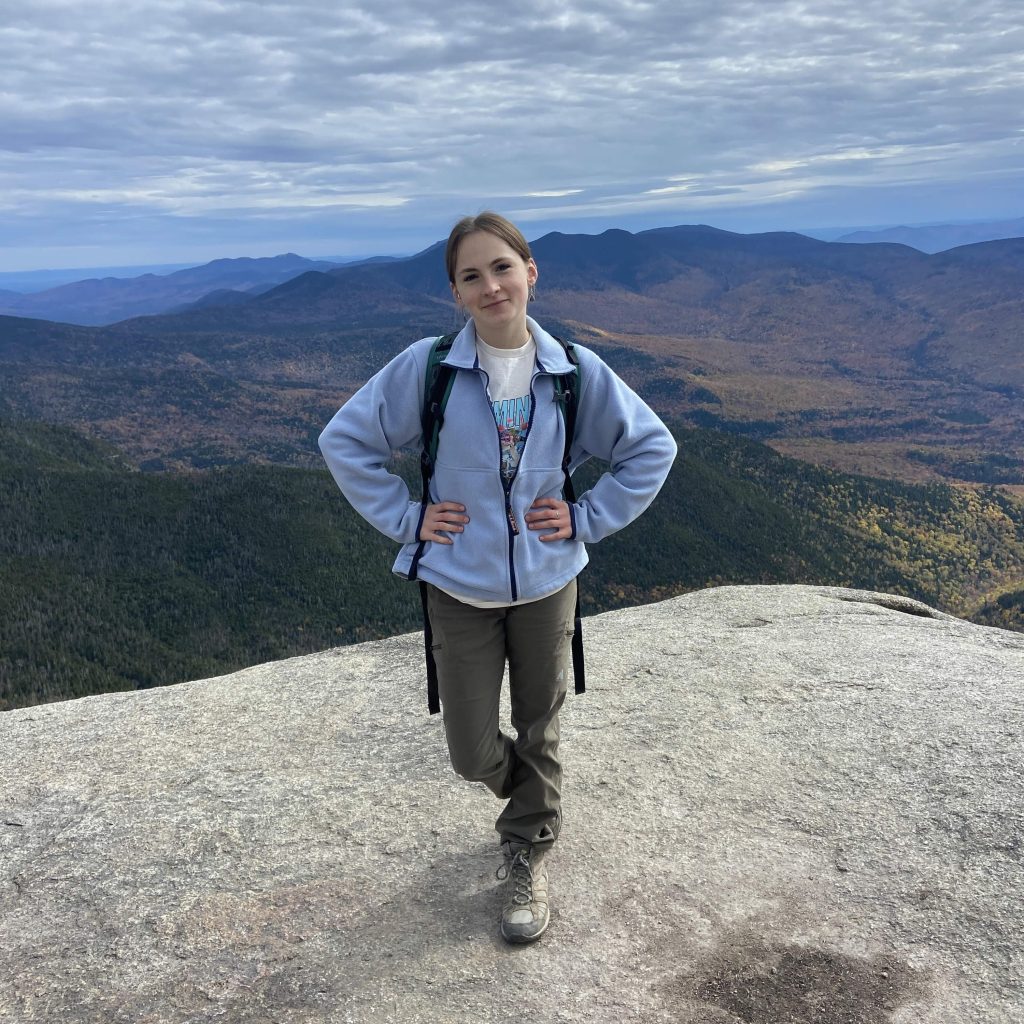 Amelia Mooney is a senior at the University of Maine Orono studying Ecology and Environmental Science. This summer she is working as a Climate Resilience Intern with Maine Farmland Trust. With the Climate Resilience team I will be compiling an impact report on the effectiveness of MFT’s new Climate Resilience Program. I will also be developing a storymap highlighting narratives from farms within MFT’s Farm Network and their experiences with climate change and loss of federal resources in climate resiliency.
Amelia Mooney is a senior at the University of Maine Orono studying Ecology and Environmental Science. This summer she is working as a Climate Resilience Intern with Maine Farmland Trust. With the Climate Resilience team I will be compiling an impact report on the effectiveness of MFT’s new Climate Resilience Program. I will also be developing a storymap highlighting narratives from farms within MFT’s Farm Network and their experiences with climate change and loss of federal resources in climate resiliency.
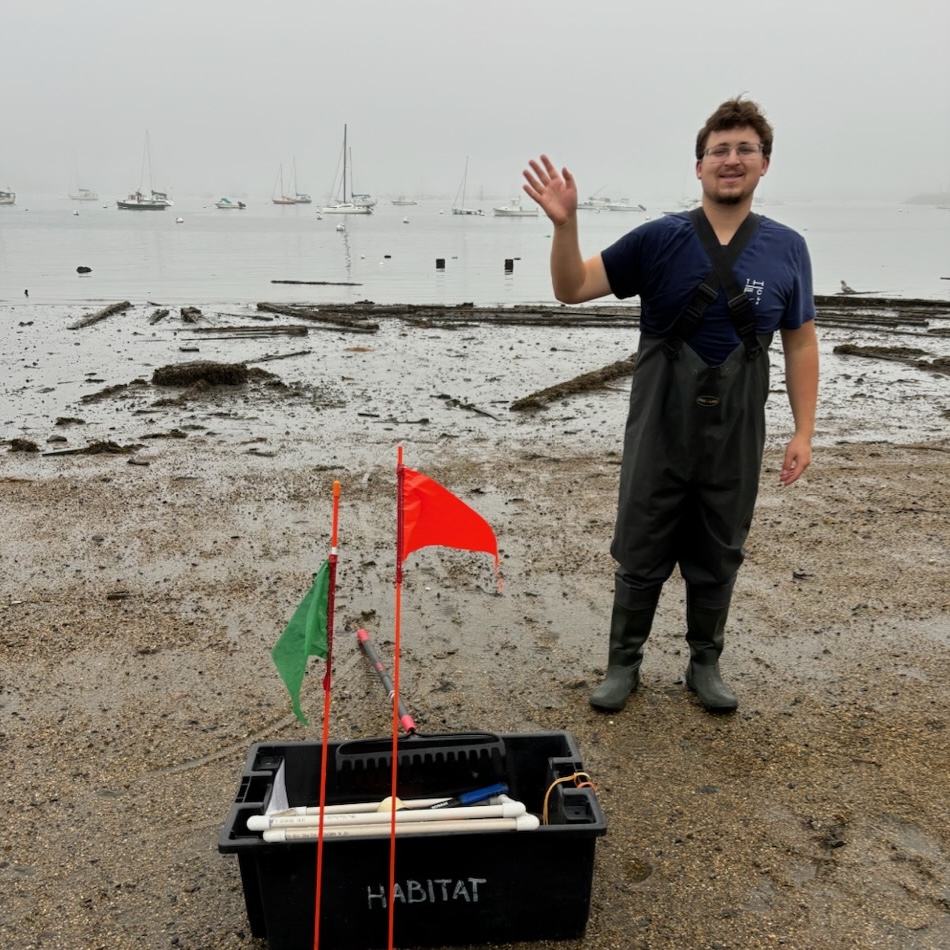 Atticus Scott graduated in May from Endicott College with a Bachelor’s in Environmental Science and a Minor in Biology. He will begin a Master’s at the University of Rhode Island in the Fall studying salt marsh migration. This summer, he is splitting his time working in the city of Ellsworth for Green Ellsworth and the Downeast Salmon Federation. For Green Ellsworth, he is acting as an assistant to the City’s tree steward Michael Otzwirk. Much of the work involves tending to the tree nursery at the Jordan Nature Preserve, which contains many different species of trees that are to be used for shoreline stabilization projects, as well as for planting along the sides of roads in the city. He has also been working for the Downeast Salmon Federation, for whom he will be assisting in designing and planning a salt marsh restoration project, as well as taking water samples from the Union River for eDNA research on the fish species profile of the river.
Atticus Scott graduated in May from Endicott College with a Bachelor’s in Environmental Science and a Minor in Biology. He will begin a Master’s at the University of Rhode Island in the Fall studying salt marsh migration. This summer, he is splitting his time working in the city of Ellsworth for Green Ellsworth and the Downeast Salmon Federation. For Green Ellsworth, he is acting as an assistant to the City’s tree steward Michael Otzwirk. Much of the work involves tending to the tree nursery at the Jordan Nature Preserve, which contains many different species of trees that are to be used for shoreline stabilization projects, as well as for planting along the sides of roads in the city. He has also been working for the Downeast Salmon Federation, for whom he will be assisting in designing and planning a salt marsh restoration project, as well as taking water samples from the Union River for eDNA research on the fish species profile of the river.
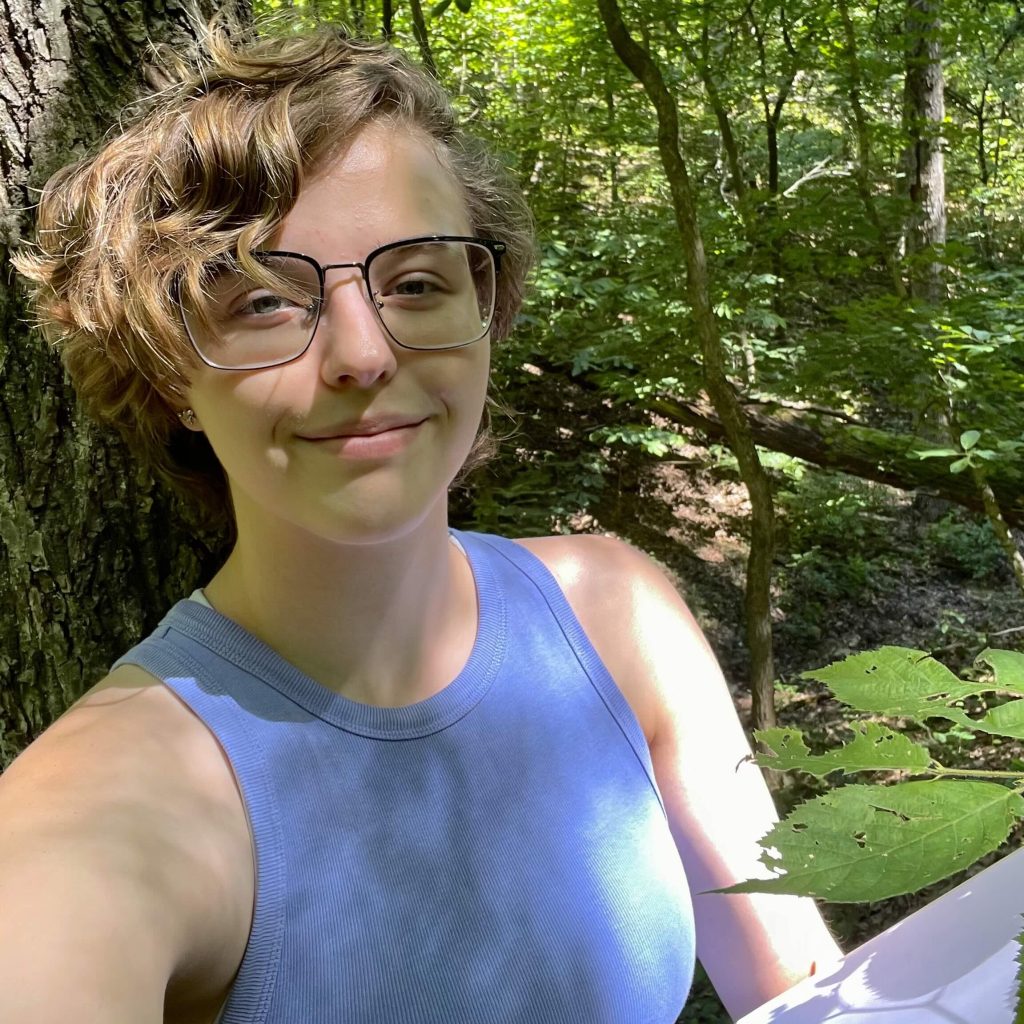 Blue Schade is a 3rd year marine science student at the University of Maine in Orono. This summer, they are working at Washington Academy to help care for one of Maine Audubon’s four community tree nurseries. The nursery, which Washington Academy cultivates native trees and plants to be used in resiliency restoration projects in coastal Washington county, is also cared for by the community through career development work study programs for local teens.
Blue Schade is a 3rd year marine science student at the University of Maine in Orono. This summer, they are working at Washington Academy to help care for one of Maine Audubon’s four community tree nurseries. The nursery, which Washington Academy cultivates native trees and plants to be used in resiliency restoration projects in coastal Washington county, is also cared for by the community through career development work study programs for local teens.
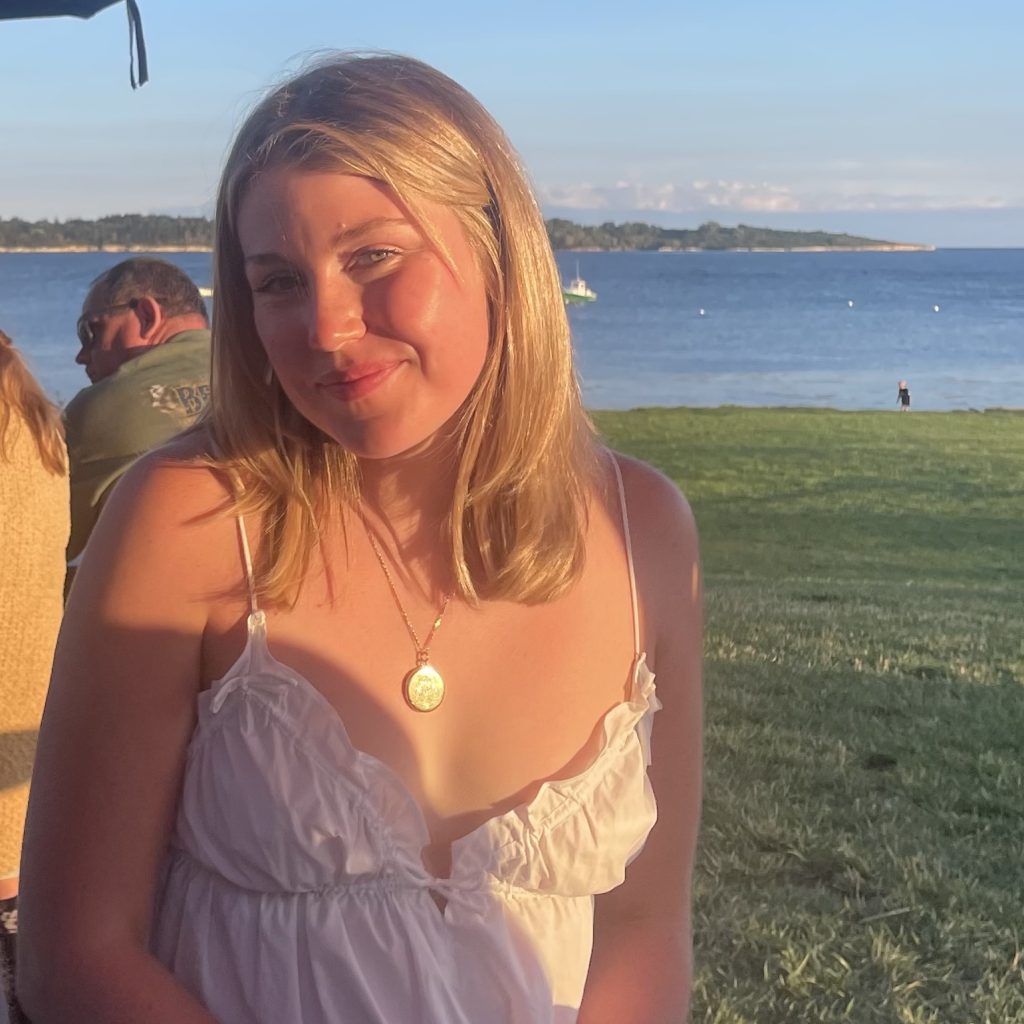 Lulu Louchheim is a 2025 graduate of Bowdoin College, where she studied Earth & Oceanographic Science and Economics and sailed competitively. This fall she is starting a two-year Master’s of Environmental Management program at Duke University, after which she hopes to go into a career in fisheries management. She is working for a second summer with the Rockport Conservation Commission, helping them with a variety of projects focused on increasing organization and accessibility of environmental data.
Lulu Louchheim is a 2025 graduate of Bowdoin College, where she studied Earth & Oceanographic Science and Economics and sailed competitively. This fall she is starting a two-year Master’s of Environmental Management program at Duke University, after which she hopes to go into a career in fisheries management. She is working for a second summer with the Rockport Conservation Commission, helping them with a variety of projects focused on increasing organization and accessibility of environmental data.
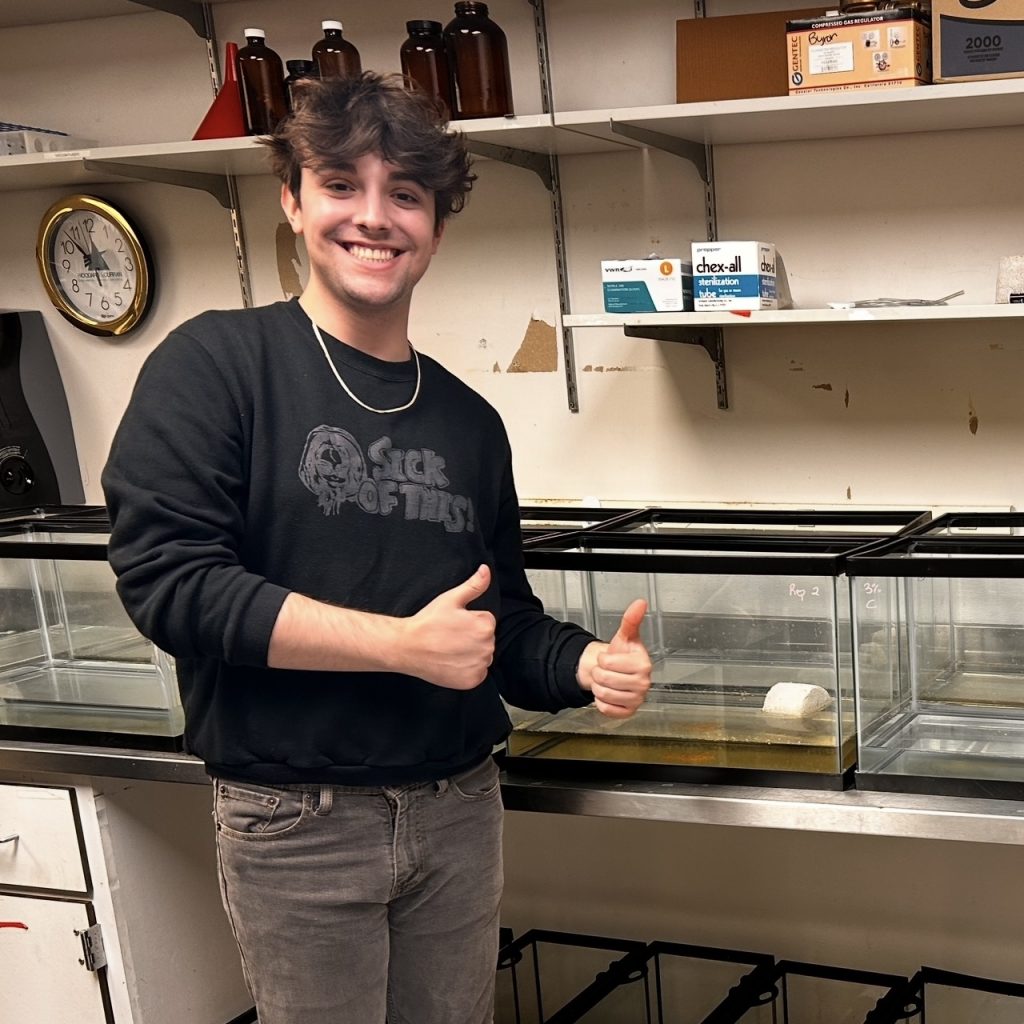
Maxwell Bleyle is a rising senior at the University of New England in Biddeford, Maine, majoring in Marine Science on the Marine Biology track, with minors in Climate Change Studies and Aquaculture and Aquarium Science. Originally from Manchester, New Hampshire, he has a strong passion for conservation. At UNE, he is part of the marine ecology lab and has been involved in research on macroalgae and mushroom-based buoys. This summer, he is working with the Island Heritage Trust on Deer Isle, Maine, supporting shoreline conservation efforts.
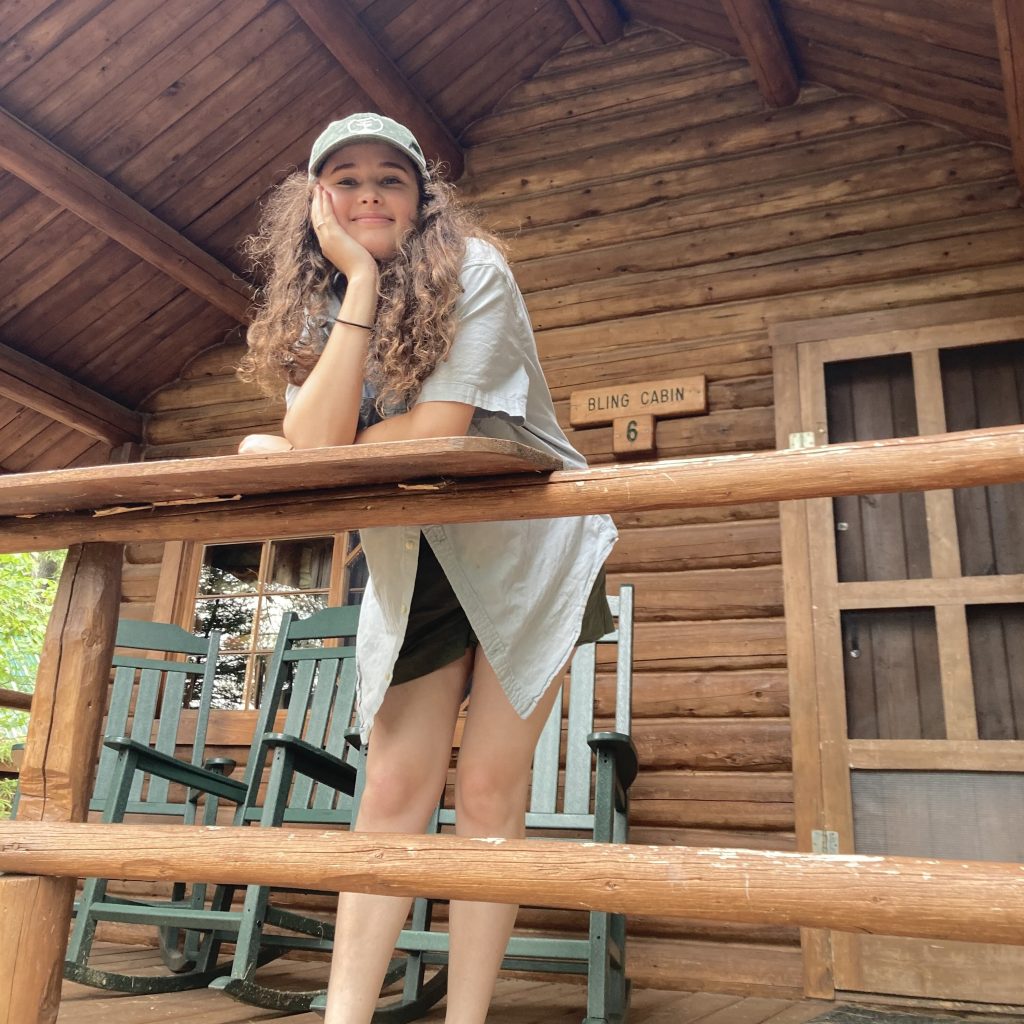
Natalia Jacob‘s love for communicating environmental stories began at a young age, when she was cast as a butterfly in her preschool’s play about monarchs. Now, she is a rising senior at Bates college, Majoring in Environmental Studies: Ecology and Earth Systems, with a minor in Theatre and Dance. This summer, she will be working for Maine Audubon at Gilsland Farm, exploring and developing new connections between distinct projects surrounding climate resilience.
Previous Interns
Summer 2024
 Ella Allan-Rahill is a third-year undergraduate student studying Environmental Science. Born and raised in Maine, she has always loved getting outside for some form of outdoor adventure: biking, paddling, skiing, and more! She is passionate about working toward solutions to the state’s environmental issues through policy initiatives and education. She is particularly interested in natural resource management and renewable energy. Her related experiences include an internship with the Natural Resources Council of Maine, involvement in campus environmental and political groups, and coursework in Political Science, Geology, and Environmental Science. This summer, she is putting her previous experience and passion to work with the Maine Forest Service.
Ella Allan-Rahill is a third-year undergraduate student studying Environmental Science. Born and raised in Maine, she has always loved getting outside for some form of outdoor adventure: biking, paddling, skiing, and more! She is passionate about working toward solutions to the state’s environmental issues through policy initiatives and education. She is particularly interested in natural resource management and renewable energy. Her related experiences include an internship with the Natural Resources Council of Maine, involvement in campus environmental and political groups, and coursework in Political Science, Geology, and Environmental Science. This summer, she is putting her previous experience and passion to work with the Maine Forest Service.
“The requirement to link our work to Maine Won’t Wait made my internship feel more valuable…”
-Rose Edwards
 Rose Edwards is a marine ecologist, sailor, artist, and educator. Her multidisciplinary career has inspired her to explore many aspects of the ocean: its beauty, complexity, vulnerability, and importance. While she calls Maine home, she has sailed and conducted marine research in the Atlantic, Pacific, and Caribbean, and earned her 100-ton captain’s license in 2024. She is pursuing a Professional Science Master’s degree in Marine Science at the University of Maine and holds a bachelor’s degree in Human Ecology from the College of the Atlantic. This summer, she is excited to join the Department of Marine Resources as they begin a long-term intertidal monitoring program that will enable the tracking of quantitative species variation on Maine’s coast.
Rose Edwards is a marine ecologist, sailor, artist, and educator. Her multidisciplinary career has inspired her to explore many aspects of the ocean: its beauty, complexity, vulnerability, and importance. While she calls Maine home, she has sailed and conducted marine research in the Atlantic, Pacific, and Caribbean, and earned her 100-ton captain’s license in 2024. She is pursuing a Professional Science Master’s degree in Marine Science at the University of Maine and holds a bachelor’s degree in Human Ecology from the College of the Atlantic. This summer, she is excited to join the Department of Marine Resources as they begin a long-term intertidal monitoring program that will enable the tracking of quantitative species variation on Maine’s coast.
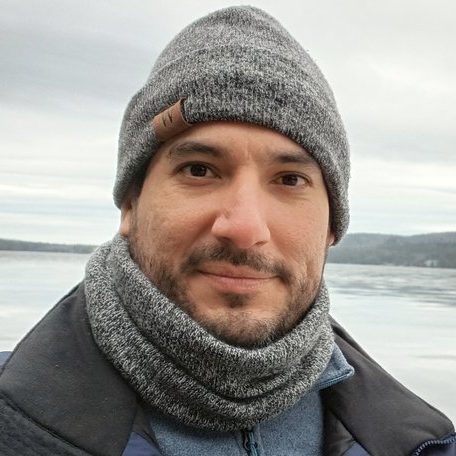 Mario Guevara has a law degree in El Salvador, where he worked with different NGOs and civil society organizations. He spent a great deal of his professional life driving to rural areas, where he engaged with communities facing exclusion and the effects of climate change. His interest in writing and blogging led him to learn about WordPress and management of web pages and social media. He joined the Communication and Journalism program (CMJ) at UMaine in 2023 interested in learning about political communication to analyze the regression of Human Rights and the decline of democracy in El Salvador. Besides teaching a course on Public Speaking, he ran the CMJ Instagram account during the 2023-2024 academic year. He has a not-so-secret passion for theater and films. Mario applied his previous experience towards elevating the visibility of the work of the University of Maine’s Agroecology Lab.
Mario Guevara has a law degree in El Salvador, where he worked with different NGOs and civil society organizations. He spent a great deal of his professional life driving to rural areas, where he engaged with communities facing exclusion and the effects of climate change. His interest in writing and blogging led him to learn about WordPress and management of web pages and social media. He joined the Communication and Journalism program (CMJ) at UMaine in 2023 interested in learning about political communication to analyze the regression of Human Rights and the decline of democracy in El Salvador. Besides teaching a course on Public Speaking, he ran the CMJ Instagram account during the 2023-2024 academic year. He has a not-so-secret passion for theater and films. Mario applied his previous experience towards elevating the visibility of the work of the University of Maine’s Agroecology Lab.

Lulu Louchheim is a rising senior at Bowdoin College, where she is double majoring in Economics and Earth and Oceanographic Science. She grew up sailing on Lake Champlain in Vermont and is now a member of the varsity sailing team at Bowdoin. She has coached sailing in Islesboro, Maine for the past two summers and is excited to spend another summer working in Maine. Lulu worked with the Rockport Conservation Commission to complete a greenhouse gas inventory for the City of Rockport – her work can be seen here an interactive Story Map version will be available upon the launch of the Rockport Climate Resilience Hub.
Summer 2023
 Santiago Tijerina was a recent honors graduate of the University of Maine, enrolled at the Salt Institute for Documentary Studies at the Maine College of Art & Design when he interned for MCSIE in the Summer of 2023. For his honors thesis, Santiago directed a documentary short film titled, Climate Action at the University of Maine. As a science communications intern for MCSIE, he continued to use visual storytelling as a catalyst for change by amplifying the mission of organizations and individuals dedicated to positive social and environmental change. Santiago collaborated with interns and student employees (graduate or undergraduate) across the State of Maine to create a documentary short film series on how their work relates to the strategies and implementation of the Maine Climate Action Plan Maine Won’t Wait. Watch those videos here! You can contact Santi at santiago.tijerina@maine.edu
Santiago Tijerina was a recent honors graduate of the University of Maine, enrolled at the Salt Institute for Documentary Studies at the Maine College of Art & Design when he interned for MCSIE in the Summer of 2023. For his honors thesis, Santiago directed a documentary short film titled, Climate Action at the University of Maine. As a science communications intern for MCSIE, he continued to use visual storytelling as a catalyst for change by amplifying the mission of organizations and individuals dedicated to positive social and environmental change. Santiago collaborated with interns and student employees (graduate or undergraduate) across the State of Maine to create a documentary short film series on how their work relates to the strategies and implementation of the Maine Climate Action Plan Maine Won’t Wait. Watch those videos here! You can contact Santi at santiago.tijerina@maine.edu
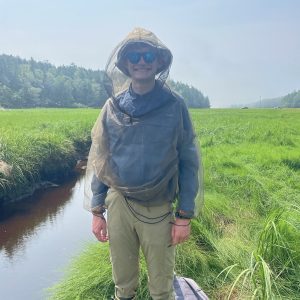 Hayden Eckblom was a junior at Bates College majoring in Earth and Climate Science when he interned with MCSIE during Summer 2023. He worked with Dr. Bev Johnson doing research in salt marshes on the Maine coast. Their research aims to determine the carbon sequestration and storage capacities of these salt marshes. In collaboration with Salt Marsh Adaptation and Resiliency Teams (SMARTeams) their work will also identify impacts of 15th-19th century farming practices on salt marshes. Their work will increase our understanding of Maine’s blue carbon stocks and methods to increase their productivity as a natural climate solution in line with Strategy E of Maine’s climate action plan. See Hayden’s work here. You can contact Hayden at heckblom@bates.edu
Hayden Eckblom was a junior at Bates College majoring in Earth and Climate Science when he interned with MCSIE during Summer 2023. He worked with Dr. Bev Johnson doing research in salt marshes on the Maine coast. Their research aims to determine the carbon sequestration and storage capacities of these salt marshes. In collaboration with Salt Marsh Adaptation and Resiliency Teams (SMARTeams) their work will also identify impacts of 15th-19th century farming practices on salt marshes. Their work will increase our understanding of Maine’s blue carbon stocks and methods to increase their productivity as a natural climate solution in line with Strategy E of Maine’s climate action plan. See Hayden’s work here. You can contact Hayden at heckblom@bates.edu
Rapid Response Interns
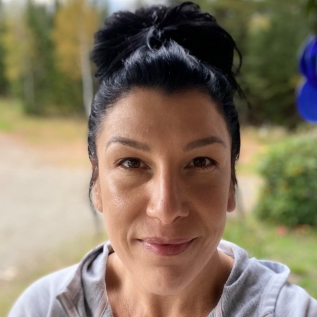
In the Fall of 2023, Maine Department of Marine Resources contacted MCSIE asking for help with a GIS inventory of intertidal monitoring data. With only three-weeks before a conference in which the new GIS layers would be shared publicly to help establish a state-wide intertidal monitoring network we needed to move fast. MCSIE reached out to GIS faculty to assess interest in a ‘Rapid Response’ Internship. Patricia Tilton a GIS graduate student at the University of Maine Machias managed to execute a 60-hour internship within those three weeks to produce the need GIS layers. The internship hours were flexible enough for her to maintain her regular school activities while earning an elevated hourly internship rate and completing the full GIS request from DMR.
Semester Interns
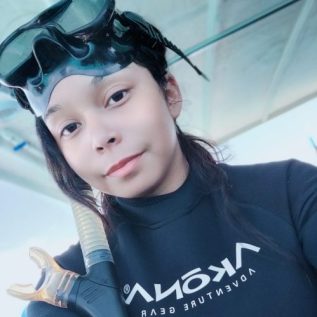
Jennifer Navarrete, was a freshman at the University of Maine when she interned with MCSIE in Spring of 2024. Her work was conducted with the Aquaculture Research Institute. She worked to create components of a virtual field trips to aquaculture farms and research facilities. By incorporating links to Maine’s Climate Action Plan and previous climate science assessments into these virtual field trips, Jennifer is showcased sustainable aquaculture practices and their connection to climate resilience. The virtual field trips aim to increase awareness of the industry among K-12 students, potentially fostering specialized workforce development and a deeper understanding of the importance of ecosystem restoration in aquaculture.
Brennan Dunton, was senior at the University of Maine in Spring 2024 when he interned with MCSIE. His work was conducted at Stillwater Environmental Engineering, Inc. He worked to create an information sheet for coastal towns and cities in preparation for the next iteration of the Municipal Separate Storm Sewer Systems (MS4) permit. Brennan’s goal was to improve communication on essential guidance for sustainable stormwater management practices. This initiative not only supports the resilience of communities facing climate impacts but also promotes environmental stewardship and sustainability more broadly. The forthcoming information sheet, which will include next steps for community implementation and links to financial resources, should empower municipalities to proactively address stormwater issues and enhance their resilience in the face of a changing climate.


